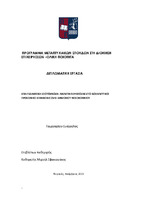Επαγγελματική εξουθένωση : μελέτη περίπτωσης στο νοσηλευτικό προσωπικό κλινικών COVID δημόσιου νοσοκομείου
Burnout syndrome : a study of cases in the nursing staff in COVID-19 clinics of a public hospital

Προβολή/
Λέξεις κλειδιά
Επαγγελματική εξουθένωση ; Επαγγελματίες υγείας ; COVID-19 ; Πανδημία ; Παθογένεια επαγγελματικής εξουθένωσης ; Επιδημιολογικά δεδομένα ; Συμπτώματα επαγγελματικής εξουθένωσης ; ΠρόληψηΠερίληψη
Το ιατρικό και νοσηλευτικό προσωπικό βρίσκεται σε αυξημένο κίνδυνο ανάπτυξης επαγγελματικής εξουθένωσης, όχι μόνο λόγο του μεγάλου φόρτου εργασίας αλλά εξαιτίας και της συναισθηματικής συμμετοχής που χαρακτηρίζει ιδιαίτερα τους εργαζομένους στα επαγγέλματα υγείας. Το φαινόμενο αυτό γίνεται ιδιαίτερα έκδηλο την εποχή της πανδημίας COVID-19 λόγω της μεγάλης πίεσης που ασκείται στο σύστημα υγείας.
Σκοπός της παρούσας εργασίας ήταν να διερευνήσουμε τη συχνότητα και την βαρύτητα του συνδρόμου στο νοσηλευτικό προσωπικό μονάδων νοσηλείας COVID και να το συσχετίσουμε με χαρακτηριστικά των εργαζομένων
Μεθοδολογία: Χρησιμοποιήθηκε για την έρευνα το ερωτηματολόγιο Maslach το οποίο διακρίνεται σε 2 τμήματα:
Α: το πρώτο τμήμα αφορά στα δημογραφικά χαρακτηριστικά των συμμετεχόντων όπως φύλο, ηλικία, οικογενειακή κατάσταση, εργασία σε ΜΕΘ ή εκτός ΜΕΘ, εργασιακή εμπειρία γενικά και σε θέση COVID ειδικότερα και επίπεδο σπουδών
Β : Περιλαμβάνει το ερωτηματολόγιο καταγραφής Επαγγελματικής Εξουθένωσης κατά Maslach (Maslach Burnout Inventory-MBI, 1986) το οποίο περιέχει 22 ερωτήσεις και το οποίο εξετάζει τις τρείς διαστάσεις της επαγγελματικής εξουθένωσης: τη συναισθηματική εξάντληση, την αποπροσωποποίηση, την έλλειψη προσωπικών επιτευγμάτων
Στη συνέχεια, έγινε κατηγοριοποίηση της συναισθηματικής εξάντλησης, της αποπροσωποποίησης και του αισθήματος προσωπικής (ή επαγγελματικής) επίτευξης του κάθε ερωτώμενου σε τρεις κατηγορίες (χαμηλή, μέτρια και υψηλή) αθροίζοντας τις επιμέρους βαθμολογίες των ερωτήσεων σε κάθε κατηγορία
Επιπλέον, έγινε κατηγοριοποίηση της συναισθηματικής εξάντλησης, της αποπροσωποποίησης και του αισθήματος προσωπικής επίτευξης σε δύο κατηγορίες (χαμηλή και υψηλή) με βάση τις οδηγίες του Maslach Burnout Inventory Manual Fourth Edition published by Mind Garden Inc.
Τέλος, με βάση την ταξινόμηση σε χαμηλού και υψηλού βαθμού κατηγορία υπολογίστηκε το MBI score
Αποτελέσματα: Στην έρευνα συμμετείχαν 102 νοσηλευτές 19 άνδρες και 83 γυναίκες.
Η συναισθηματική εξάντληση ήταν χαμηλή σε 70 και υψηλή σε 20 ενώ σε 2 απροσδιόριστη, η αποπροσωποποίηση ήταν χαμηλή σε 86 και υψηλή σε 11 και η προσωπική επίτευξη χαμηλή σε 50 και υψηλή σε 44 ερωτηθέντες.
Ως προς το ΜΒΙ score οι ερωτηθέντες ήταν αναποτελεσματικοί στο 32.3%, αφοσιωμένοι στο 28.4%, υπερφορτωμένοι στο 18.6%, εξουθενωμένοι στο 8.8%.
Δεν διαπιστώθηκε συσχέτιση της συναισθηματικής εξάντλησης με κανένα χαρακτηριστικό των ερωτηθέντων
Διαπιστώθηκε στατιστικά σημαντική συσχέτιση της αποπροσωποποίησης με την διάρκεια εμπειρίας στο COVID και με το επίπεδο σπουδών. Συγκεκριμένα εργαζόμενοι στα Covid για περισσότερο από ένα χρόνο εμφανίζουν μικρότερα ποσοστά αποπροσωποποίησης από τους εργαζόμενους στα Covid λιγότερο από ένα χρόνο. Επιπλέον ως προς το επίπεδο σπουδών οι απόφοιτοι τεχνικών σχολών φαίνεται ότι έχουν τα χαμηλότερα ποσοστά αποπροσωποποίησης και οι κάτοχοι τίτλου μεταπτυχιακών σπουδών τα υψηλότερα.
Ως προς την προσωπική επίτευξη φαίνεται ότι επηρεάζεται από την διάρκεια εμπειρίας στα COVID και την ηλικία των ερωτηθέντων. Ως προς την διάρκεια εμπειρίας φαίνεται ότι στις κατηγορίες εργασιακής εμπειρίας μεταξύ 2-6 μηνών και μεταξύ 7-12 μηνών η μέση τιμή της προσωπικής επίτευξης εμφανίζει αύξηση, και στη συνέχεια προοδευτικά μειώνεται. Ως προς την ηλικία το αίσθημα προσωπικής επίτευξης μειώνεται όσο αυξάνεται η ηλικιακή κατηγορία με στατιστικά σημαντική μείωση του δείκτη προσωπικής επίτευξης από την κατηγορία 26-35 έτη στην κατηγορία 46-55 έτη.
Ως προς το MBI score αυτό συσχετίσθηκε με την διάρκεια εργασιακής εμπειρίας στα COVID. Συγκεκριμένα οι εργαζόμενοι με εμπειρία μικρότερη από 12 μήνες εμφανίζουν αυξημένα ποσοστά εξουθένωσης (burn-out) σε σχέση με τους εργαζόμενους με εργασιακή εμπειρία μεγαλύτερη από 12 μήνες.
Ως προς την αναγνώριση από διάφορους φορείς οι εργαζόμενοι σε μονάδες Covid αποζητούν περισσότερο την ηθική ικανοποίηση από τους ασθενείς (66.67%), λιγότερο από τους συναδέλφους (49.02%) και ακόμα λιγότερο από την διοίκηση και την πολιτεία (45.1% και 42.16% αντίστοιχα). Δεν παρατηρήθηκε σημαντική διαφορά στις απαντήσεις των εργαζομένων στις ΜΕΘ με τους εργαζόμενους εκτός ΜΕΘ σε όσον αφορά την ηθική ικανοποίηση που αποζητούν από τους ασθενείς και από το κράτος-πολιτεία. Επιπλέον οι εργαζόμενοι στη ΜΕΘ φαίνεται ότι αναζητούν λιγότερο την ηθική ικανοποίηση από τους συναδέλφους τους και την ηθική ικανοποίηση από την Διοίκηση σε σχέση με τους εργαζομένους εκτός ΜΕΘ
Συμπεράσματα: Tα αποτελέσματα αυτά αναδεικνύουν ότι η αποπροσωποποίηση συσχετίζεται με την διάρκεια εμπειρίας στα COVID (μικρότερη για τους εργαζόμενους περισσότερο από ένα χρόνο) κα το επίπεδο σπουδών (μεγαλύτερη για τους κατόχους μεταπτυχιακού τίτλου σε σχέση με τους αποφοίτους τεχνικών σχολών). Η προσωπική επίτευξη φαίνεται ότι επηρεάζεται από την διάρκεια εμπειρίας στα COVID ( μεγαλύτερη για κάτω των 12 μηνών) και την ηλικία των ερωτηθέντων (μείωση με την αύξηση της ηλικίας). Το MBI score συσχετίσθηκε με την διάρκεια εργασιακής εμπειρίας στα COVID (αυξημένο για τους έχοντες εργασιακή εμπειρία μικρότερη των 12 μηνών). Τα αποτελέσματα είναι σημαντικά διότι μπορεί να οδηγήσουν στην διαμόρφωση στρατηγικής αντιμετώπισης της επαγγελματικής εξουθένωσης των εργαζομένων τόσο στην εργασιακή καθημερινότητά τους όσο και σε παρόμοιες υγειονομικές κρίσεις στο μέλλον.

